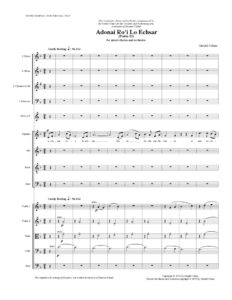About – Score – Text – Arrangements – Listen/Watch – Performances
Piano score: $3.00
Score and parts with string quartet: $15.00
H.L. Miller Cantorial School Choir; Jacob Agar, Arielle Green, and Jacob Greenberg, soloists; Cantor Natasha Hirschhorn, conductor
About
Oseh Shalom was commissioned by Temple Sholom, Greenwich, CT for Cantor Asa Fradkin and Sasson: The Temple Sholom Teen Choir, in celebration of its centennial. I had never written a choral setting of this very familiar text, and delighted in having the opportunity for Cantor Fradkin, this dedicated teen choir, and this occasion. In this setting, I chose to expand upon the traditional Hebrew text, making it both more personal and more universal: where the original text asks for peace “for us and for all Yisrael,” the text here speaks of peace “within myself, for us and for all Yisrael, and all who dwell on earth, and all of the world/universe.” The simple, but wide-ranging melody is first heard in Hebrew in the solo voice, then in the full choir, before the choir begins a contrasting section, with the text in English. Finally, the original melody returns, bringing us to a peaceful conclusion. The premiere of the piece was at Temple Sholom in May, 2016.
Score
Text
Oseh shalom bimromav,
Hu yaaseh shalom b’kirbi,
Aleinu v’al kol Yisrael,
V’al kol yoshvei tevel,
V’al kol haolam,
V’imru amen.
O You who makes peace in the heavens,
Make peace within myself,
For us and all Yisrael,
And all who dwell on earth,
And all our precious world,
And all our wondrous world,
And let us say amen.
Arrangements
—Arrangement for solo voice and piano (2020)
—Arrangement for chorus with string quartet
To purchase score and parts, contact Gerald Cohen: gerald@nullgeraldcohenmusic.com
PDF version of score and parts: $2.50 a copy (minimum 6 copies)
Listen/Watch

The Temple Sholom Teen Choir, Cantor Asa Fradkin, solo, Gerald Cohen, conductor
Performances
Premiere: May 2016: The Temple Sholom Teen Choir, Cantor Asa Fradkin, solo, Gerald Cohen, conductor; Greenwch, CT
January 2017: Shir Chadash: The Brooklyn Jewish Community Chorus, Cantor Natasha Hirschhorn, solo, Rachel Brook, conductor; Brooklyn, NY
May 2017: Gerald Cohen Vocal Ensemble, Cantor Asa Fradkin, solo; Scarsdale, NY
January 2018: Colorado Hebrew Chorale, Cantor Asa Fradkin, solo, Carol Kozak Ward, conductor; Denver, CO
January 2020: H.L. Miller Cantorial School Choir, Jewish Theological Seminary; Jacob Agar, Arielle Green, and Jacob Greenberg, soloists; Cantor Natasha Hirschhorn, conductor; New York, NY










